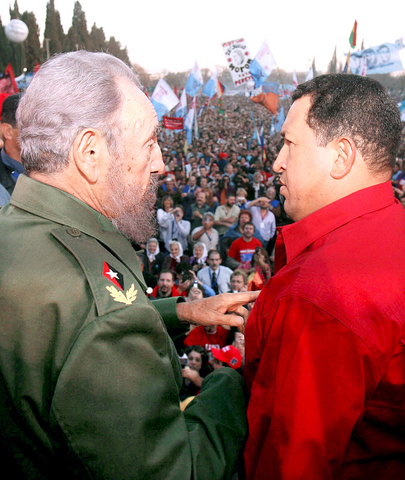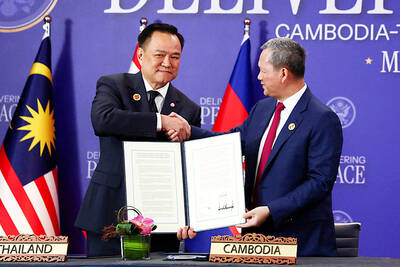Cuba's Fidel Castro and Venezuela's Hugo Chavez rallied thousands of leftist sympathizers after a South American trade summit here, railing against the US-backed free market policies they blame for many of Latin America's woes.
Addressing 15,000 people including students decades younger late on Friday, the 79-year-old Castro joined Chavez in an anti-US rally praising Venezuela for its entry into the South American trade bloc Mercosur -- a move that gave that group a hard push to the left.
"Ole! Ole! Fidel!" the crowd chanted as some waved red flags emblazoned with the image of Argentine revolutionary Ernesto "Che" Guevara, who spent several boyhood years in Cordoba before joining Cuba's revolution.

PHOTO: EPA
"Mercosur once was just four countries. Now it is improved and is expanding," Castro declared during his three-hour speech from a stage beneath a banner reading, "Integration is our flag."
Cuban, Venezuelan and Argentine flags flapped nearby.
Leftist labor and student groups took part in the rally, a rare chance for Argentines to see the Cuban leader who last visited in May 2003 for the inauguration of moderate leftist President Nestor Kirchner.
Also attending were leaders of the Mothers of the Plaza de Mayo, the famously kerchiefed human rights activists whose sons and daughters went missing during Argentina's 1976-83 dictatorship.
Castro vowed his communist nation would continue to survive a more than four-decade-old US trade embargo.
"In the neoliberal world everyone is talking about globalization, about the globalization of goods and services. But nobody is talking about the globalization of solidarity" he added.
He lauded Chavez for emulating Cuba's own programs to send doctors and teachers to poor people throughout Latin America.
Cordoba has special significance for Castro because of Guevara's ties here. But the Cuban leader dashed some local hopes he might visit Alta Gracia, a nearby community that was Guevara's boyhood home. Born in Argentina, Guevara fought in Cuba's revolution and was killed in 1967 while directing a guerrilla movement in Bolivia.
Earlier on Friday, Kirchner welcomed the "historic" addition of oil-rich Venezuela, the continent's No. 3 economy after Brazil and Argentina, into the once-sleepy customs union called Mercosur.
Chavez, who admires Castro as his leftist ally and political mentor, urged Mercosur to put aside internal squabbles and stand against the US-backed free-market policies he says have enslaved the region.
He told Friday night's rally that a Free Trade Area of the Americas, or FTAA, proposed in 1994 amid lofty goals of uniting the hemisphere in one tariff-free zone, was now dead.
"FTAA be damned!" Chavez declared to applause.
Chavez said Mercosur would be the engine for Latin American growth, adding he hoped leftist President Evo Morales of Bolivia, who took office in January, along with Cuba, would become full members of the trade bloc.
"Latin America has all it needs to become a great world power. Let's not put any limits on our dreams. Let's make them reality," Chavez said.
The addition of Venezuela gives Mercosur a combined market of 250 million people and a combined output of US$1 trillion in goods and services annually, said Brazilian President Luiz Inacio Lula da Silva during Friday's summit.
NAFTA, combining the markets of the US, Canada and Mexico, has 450 million consumers and a combined gross product of about US$14 trillion.
Alejandra Lopez, a 57-year-old Argentine who watched Castro from the crowd, said she hopes that a region where millions are still in poverty will be transformed.
Lopez, whose brother was a leftist militant killed in Argentina's last dictatorship, said she and others are "fighting for the liberation of Latin America."
But critics said the new Mercosur marked a worrisome decline in US influence in the region.
Michael Shifter, an analyst at the Inter-American Dialogue in Washington, said Venezuela's entry should be a "wake-up call" for US officials distracted by the conflict in the Middle East.
"Mercosur seems to have less and less to do with free trade and more to do with politics," he said.

Shamans in Peru on Monday gathered for an annual New Year’s ritual where they made predictions for the year to come, including illness for US President Donald Trump and the downfall of Venezuelan President Nicolas Maduro. “The United States should prepare itself because Donald Trump will fall seriously ill,” Juan de Dios Garcia proclaimed as he gathered with other shamans on a beach in southern Lima, dressed in traditional Andean ponchos and headdresses, and sprinkling flowers on the sand. The shamans carried large posters of world leaders, over which they crossed swords and burned incense, some of which they stomped on. In this

‘NO COUNTRY BUMPKIN’: The judge rejected arguments that former prime minister Najib Razak was an unwitting victim, saying Najib took steps to protect his position Imprisoned former Malaysian prime minister Najib Razak was yesterday convicted, following a corruption trial tied to multibillion-dollar looting of the 1Malaysia Development Berhad (1MDB) state investment fund. The nation’s high court found Najib, 72, guilty on four counts of abuse of power and 21 charges of money laundering related to more than US$700 million channeled into his personal bank accounts from the 1MDB fund. Najib denied any wrongdoing, and maintained the funds were a political donation from Saudi Arabia and that he had been misled by rogue financiers led by businessman Low Taek Jho. Low, thought to be the scandal’s mastermind, remains

Near the entrance to the Panama Canal, a monument to China’s contributions to the interoceanic waterway was torn down on Saturday night by order of local authorities. The move comes as US President Donald Trump has made threats in the past few months to retake control of the canal, claiming Beijing has too much influence in its operations. In a surprising move that has been criticized by leaders in Panama and China, the mayor’s office of the locality of Arraijan ordered the demolition of the monument built in 2004 to symbolize friendship between the countries. The mayor’s office said in

FIGHTING CONTINUES: Thai military dropped 40 bombs on border areas, Cambodia said, while Bangkok said Phnom Penh launched heavy attacks and damaged homes Cambodia yesterday accused Thailand of intensifying its bombardment of disputed border areas, even as officials from the two countries attend a multi-day meeting aimed at negotiating an end to deadly clashes. The neighbors’ long-standing border conflict reignited this month, shattering an earlier truce and killing more than 40 people, according to official counts. About 1 million people have also been displaced. Cambodian and Thai officials were in their third day of talks at a border checkpoint, with ministers of defense from the two countries scheduled to meet today. However, the Cambodian Ministry of National Defense said Thailand’s military carried out a heavy